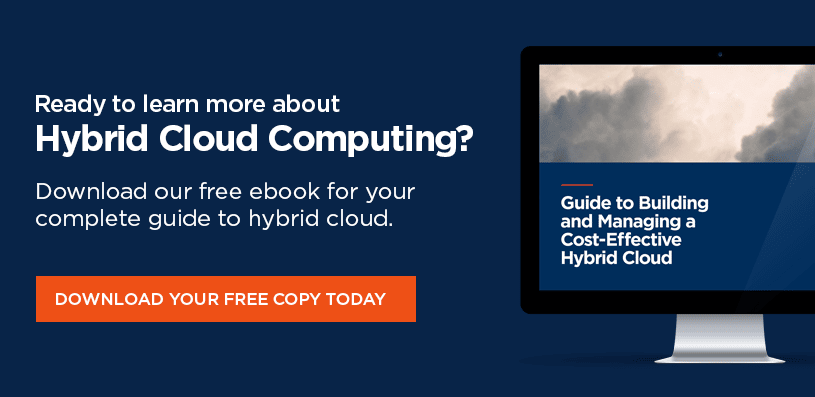07-22-16 | Blog Post
You already know that there are three major types of clouds: Public, Private and Hybrid. Now, there’s a newer player in the game: Virtual Private Clouds. What makes these different from public and private clouds, and what is the benefit? Is it just a fancy name for public cloud, or is it a private one?
Virtual Private Clouds (VPC) are related to the public cloud, but they are not the same. Instead of sharing resources and space in a public infrastructure, you get a changeable allotment of resources to configure. There is a certain level of isolation between you and other users, via a private IP subnet and virtual communication construct (such as a VLAN) on a per user basis. This ensures a secure method of remotely accessing your cloud resources. This isolation within a public cloud lends the name “virtual private” because you are essentially operating a private cloud within a public cloud.
That also doesn’t mean Virtual Private Clouds and private clouds are the same. Private clouds are entirely dedicated to your organization, and that includes the hardware. Virtual Private clouds do not have the same hardware dedication; it just creates a more secure environment on public infrastructure. Think of it as operating like a VPN: You use them to send messages over the public internet in a secure way as if you had your own personal network, but it’s not the same as actually having your own.
What’s the benefit to this? Wouldn’t it just be easier to have a private cloud? Not necessarily. Private clouds are expensive to operate, and because the hardware as well as the resources required to run it belong to you alone, there is no one to share that cost with. Virtual Private Clouds are a more affordable cloud solution for businesses because they give you the best of both worlds: A private cloud for security and compliance purposes, reduced infrastructure costs that come with public clouds. The allotment of resources is yours to use, so there is no worry about running out or having to share with others. You simply are sharing the infrastructure.
Virtual Private Clouds are commonly used with Infrastructure as a Service (IaaS) providers. Because the shared resources (CPU, RAM, etc.) are not always the responsibility of the hardware provider, it is possible to have different infrastructure and VPC providers. However, having the same VPC and infrastructure provider can help cut down on the confusion and communication process between you and your vendor.
If you’re looking for a provider with cloud capabilities, Virtual Private Clouds could be an option for your business. Essentially a specific hybrid cloud solution, they offer similar benefits as private clouds but with the shared infrastructure of public clouds. No matter what solution you decide to choose, make sure to research your providers carefully. Happy cloud hunting!
Looking to get started with Virtual Private Cloud? Otava offers a secure, compliant managed VPC environment for the small business and enterprise alike. Find out more about our entire suite of managed cloud offerings, including public cloud, or download our free white papers about public, private, and hybrid cloud.

Are Virtual Private Clouds as Secure as Private Clouds? Virtual private clouds are a hot ticket these days—everyone wants them. We know they aren’t the same as a fully private cloud. But do the differences extend to security, too? (read more)
Public vs. Private Cloud Computing Whether a public, hybrid, virtual private or private cloud, everyone agrees that cloud computing key benefits include scalability, instant provisioning, virtualized resources and ability to expand the server base quickly… (read more)
When Should You use a Managed Cloud? In today’s fast-paced world, organizations are no longer asking themselves “should I move to the cloud?” but rather, “What kind of cloud is best for my business?” Statistics show that 94 percent of organizations are exploring multi cloud… (read more)
Top 5 Reasons Why Your Company Should Transition to Private Cloud Computing: One of the biggest IT buzz words of the past few years, ‘cloud computing’ has brought incredible promise to the world of information technology. Cloud computing interest has lead to widespread curiosity and awareness of public cloud services… (read more)